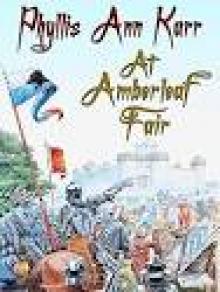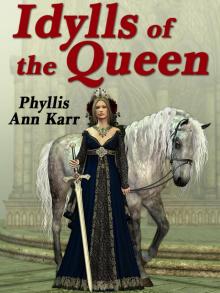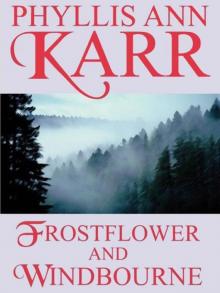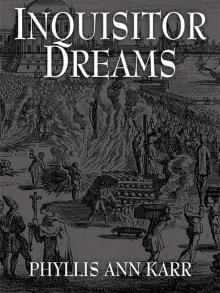- Home
- Phyllis Ann Karr
The Idylls of the Queen Page 25
The Idylls of the Queen Read online
Page 25
“No, you mooncalf, I said one of his kinsmen. Weren’t some of them ready to kill Tristram when Tristram’s fame started threatening to eclipse the noble Lancelot’s?”
“And Sir Lancelot himself promised to kill the first of them with his own hands who dared attack the noble Sir Tristram in treachery!”
“Yes, because he got wind of it in time. Since I’ve never heard anyone suggest that’s what may have been meant to happen to Lamorak de Galis, obviously Lancelot couldn’t have got wind of it soon enough in Lamorak’s case. But Lamorak was the only other knight, besides Gawain and Tristram, who might have been able to win himself more fame than your marvelous Du Lac.”
“I will not believe that my lady mother died for some jealousy between Sir Lamorak and the men of my lord Sir Lancelot.… I have struggled all this time to forget and forgive and tolerate my brothers’ company again—why do you come now and open the old wounds?”
“If you don’t believe Lamorak killed your mother, Beaumains,” I said, “how can you be content to let her real murderer go unknown and unpunished? If not for Dame Morgawse’s sake, at least to clear up the doubt on Lamorak’s memory?”
“No true man has ever doubted Sir Lamorak’s memory.” Beaumains rose, quivering slightly. “Since you will not leave my company, Seneschal, I will leave yours.”
I let him go. Having as much of his opinions as could probably be of any use—I forgot until too late to question him about Pinel, but I doubt Beaumains would have recognized any unsuccessful attempt on his life even in the unlikely chance one had been made—I believed I could make better progress for a while with my own thoughts.
I did not have long to sit alone with them, however, before I heard horses approaching, and someone hailing me as “Hullah! Good sir!”
I turned to see Ironside and Agravain riding their palfreys through the forest towards me. They were unarmed, their armor clanking faintly on the mules their squires led some distance behind. Ironside had his right arm in a sling, while Agravain had one side of his face bandaged from forehead to midcheek. It must have been an extreme annoyance to anyone as proud as Agravain of his handsome appearance.
“Hullah!” called the red giant again. “It’s Kay! And yonder lies Astolat?”
I walked forward while they rode, until we met close enough to talk without shouting. “We looked for you yesterday,” I said. “Were you within a few miles, or have you been riding all night?”
“Within a few miles, man,” said Ironside, “but half addled out of our wits, the both of us.”
“Guessing ourselves to be in the vicinity of brother Mordred’s rendezvous with an afternoon to spare,” Agravain explained, “we indulged in the foolishness of a friendly joust. When it was over, neither of us was in fit condition to ride farther that night.”
“You should have postponed your joust until you got here,” I said. “You could have joined our little tourney yesterday and, with luck, been mowed down by Gawain and Ywain. You could also have been healed by the Lady of the Lake—she was here then, and she closes up serious wounds very cleanly, though she doesn’t bother with bumps and bruises since you’ll feel them awhile anyway.” Explaining briefly that Dame Nimue had left because Pelleas would not stay after Gawain’s arrival, I looked at the bandage covering half of Agravain’s countenance and added, “Well, don’t worry, Fair-Face. Most folk say the scar on Lancelot’s cheek improves his beauty.”
“Dame Tamsine assures me there should be no scar,” Agravain replied, a bit stiffly. “Good dame!”
The squires, chargers, and pack animals had remained half hidden by trees. Now, as she rode forward to Agravain’s call, I saw that one of the two squires was in fact a wench or damsel in a plain buff-colored gown.
“Dame Tamsine joined us when we left Florence at Sir Hervin’s hermitage to heal his leg,” said Agravain. “Besides making a passable squire, she is an excellent leech and very pleasant company.”
I exchanged greetings with Tamsine, who had a pretty smile with a wide gap between her two front teeth, and was probably so flattered at being called “Dame” that she was more than eager to do everything she had ever heard a lady of the court might do. “What happened to Florence’s leg?” I asked.
“Fell off his horse our third day out and broke his ankle,” said Ironside. “Young noddlehead lost count of how many saddle girths he’d tightened and forgot his own.”
“We’ll hope he’s learned his lesson,” I remarked. “And which of you two old noddleheads suggested that friendly fight of yours within a few miles of Astolat?”
Agravain shrugged. Ironside said, “Hardly remember. I suppose I may have done. Grew out of our talk at dinner somehow. Well, all’s well that ends well, and a happy thing sweet Dame Tamsine knows her leechcraft, eh?”
I agreed and brought them to Sir Bernard’s manor in time for Morningsong, Mass, and breakfast. By midmorning, when Gaheris and Astamore still had not arrived, Mordred and I went into the woods, found a glade where there was not so much chance of being overheard, and talked the situation over.
“It could have been a stroke aimed to split brother Agravain’s brainpan,” said Mordred. “Though I can hardly think why it missed its purpose. Unless, perhaps, Agravain’s helm proved sturdier than Ironside had calculated.”
I shook my head. “The helmet wouldn’t have saved him. Ironside has too strong an arm.”
“Knowing his great strength, he may have reckoned that only a part of it would be enough. Or brother Agravain may already have dealt his own blow to Ironside’s right arm before Ironside’s swing. Or it may, after all, have been a mere friendly guileless exercise of arms.”
“What was Ironside doing swinging at his opponent’s head in a friendly exercise of arms?” I wanted to know.
“Battle rage and battle chance. It happens often enough, Seneschal, though you may disapprove of the waste. They may simply have been trying to impress ‘Dame’ Tamsine. Still, I would like to have seen it.”
“I’d like to have heard the conversation that led to it. Ironside may have made Agravain suggest it himself, to impress Tamsine—though that’s more subtle than I’d give Ironside credit for, and I don’t think they needed any extra embellishments to impress their little dame. For that matter, with only Tamsine and his own squire to see it, why should Ironside have stopped with one stroke to the helm, if he’d meant to kill? Even if Agravain had already disabled his right arm, I’ve seen the giant’s son knock out a knight’s brains with his left arm and the end of his shield.”
Mordred shrugged. “We do appear to be reasoning it into the innocent battle the jovial red giant claims. At the same time, they seem to have been singularly haunted by accidents. Interesting, that such a misfortune should have overtaken Florence. He is usually so meticulous about his horse’s harness.”
Florence was Gawain’s second son, named for his mother, Dame Floree, and serving out the last few months of a long squirehood under his uncle Agravain the way his younger brother Lovel was serving under Mordred. The question of Florence’s accident had already occurred to me.
“Falling from a horse doesn’t usually result in disabling injuries,” I said. “Not in itself.”
“Aye, and you should know, Seneschal, having taken so many falls in jousting.”
I decided to overlook that comment. “If Ironside had wanted to harm Gawain’s son, he might have found a surer way than loosening the saddle girth. Florence would most likely have come off with bruises. As it is, a simple broken ankle isn’t the most serious of injuries, with decent leechcraft. And the accident would have alerted them to be more careful.”
“It hardly alerted our guileless Agravain to beware of entering combat with Ironside, whose own mind, as you yourself remarked, is probably not over-subtle. However, it may have been nothing more than a prank of Ironside’s squire. Or even a palfrey subtler than her masters, whose bloating of her belly during the saddling process for once escaped Florence’s attention. Nevertheless, I fin
d it interesting that Gawain’s son should have suffered a broken ankle and Gawain’s brother a wound in the head while traveling with the man who once swore to have Gawain’s life.”
“You might not have found it so interesting if you still held me your chiefest suspect,” I said, wondering if, secretly, he still did. “Do you know of any grievance Gaheris might have against Astamore?”
Mordred lifted his brows slightly. “Bagdemagus, of course.”
“No. Not what Astamore might hold against Gawain and the rest of you. What Gaheris might hold against Astamore.”
Mordred thought for a moment. “Unless Gaheris has surely discovered Astamore to be our brother’s would-be poisoner, I can think of nothing. Although Gaheris does not always proclaim his grievances before taking action to set them right.”
“And if he discovered Astamore to be the poisoner, would Gaheris bring him back alive to confess his crime or stand his trial before the full court? Or would he bring back Astamore’s head and his own unsupported testimony to convince Mador?”
“I had thought the question in our minds was whether Astamore would allow Gaheris to rejoin us unscathed,” said Mordred.
We sat awhile in silence, each presumably pursuing a different line of thought. “King Pellinore’s death,” I said at last. “Eliezer says Gawain fought Pellinore in fair battle; Gawain doesn’t say much more than he does about Lamorak’s death. Was the tale of Pellinore’s squire true that Gaheris cut Pellinore down from behind while Gawain was too busy in front to see what his brother was doing?”
“How should I know more of it,” Mordred inquired, “than you? Ask Gawain and his squire. Or Gaheris himself.” (Pellinore’s squire had died a few years afterwards of smallpox.) “But are you not ranging rather far afield,” Mordred went on, “if your purpose is to save the Queen?”
“Maybe. But the key to this coil must be somewhere, even if it’s a very rusty key by now.”
“And you are the rusty key to find it, eh, Seneschal?”
I gave him a short glare. “Not so rusty I couldn’t give you another defeat for all your youth and practice.”
I considered asking him whose idea it had been—Gawain’s or one of his brothers’—to invite Dame Morgawse to her oldest son’s castle beside Camelot. But Mordred’s temper inflamed too easily whenever the conversation touched his mother’s death, and I needed his cooperation. “Mordred, when they join us, assuming they do, I want a small, private meeting, just you, your brothers, and me.”
His eyes gleamed. “A game of your own, Seneschal? And what shall you do with us when you gather us together?”
“Maybe warn you. Maybe surprise you. And it may not be pleasant. I want to be well away from any curious eyes and ears. Say, in one of Sir Bernard’s cellars.”
“Beaumains also?”
“Yes, Gareth Beaumains also. All five of you. We may need our host’s invitation to get Beaumains into the party. Can you answer for Gaheris and Agravain?”
“Agravain, yes. Gaheris, if he comes.”
“And I think Gawain will join us readily enough at my invitation,” I said.
“And who will keep watch on our suspected traitors while we are all six tucked away in the bowels of Astolat manor?”
“I doubt they’ll do anything. We’ll post Eliezer in the passage to guard our privacy, and an assassin would have to get past both him and Sir Bernard’s folk to try burning us all together or some such unlikely trick. Ywain and the squires will be at the pavilions, not to mention the two innocent ones of our suspects, if either Ironside, Astamore, or Pinel is our traitor and tries to escape. Which is hardly likely, if he hasn’t tried to escape when he was riding in a much smaller company.”
I got to my feet, but paused before leaving our glade. “Oh, by the way, I don’t think it was Ironside.”
Mordred raised his brows again. “Because, having jousted with Agravain, he failed to deal with him to the uttermost?”
“No. Because just after we realized Patrise had died of poison, and before you demonstrated that the poison was in the fruit, Ironside sneaked the last bite of whatever out of his mouth. A man who knew what dish was poisoned would have known he hadn’t taken any of it.”
“Ah, so you’ve finally remembered that action. Did you notice it at the time or when we watched the tragedy again in Aunt Morgan’s mirror?” Mordred grinned broadly. “In my opinion, Sir Seneschal, you are playing as devious and perilous a game as I have ever known you to play, in your open, careful nature.”
CHAPTER 31
Further Conversations at Astolat
“Alas, said Gaheris, that is foully and shamefully done, that shame shall never from you; also ye should give mercy unto them that ask mercy, for a knight without mercy is without worship.”
—Malory III, 7
I talked to Gawain and the baron of Astolat that same afternoon, leaving them to talk to Gareth Beaumains. Mordred, meanwhile, arranged for Agravain’s attendance. I did not specifically ask Ywain to keep watch on Ironside, Pinel, and Astamore, since the fact that we suspected them rather closely of Sir Patrise’s death had so far been my secret and Mordred’s, shared only, perforce, with Dames Nimue and Morgan. I was reasonably confident that Ywain, Gillimer, or one of the other folk about the place would notice should anyone try to slip away furtively in alarm over a private meeting of Gawain and his brothers.
I also talked to Gawain’s squire Eliezer, but not solely to arrange for his standing guard outside our gathering. I put to him the same question I had asked Mordred about the death of King Pellinore.
“My master fought a fair and noble battle,” was all the old squire would say at first. “And good a fighter as Sir Pellinore was, Sir Gawain was a better.”
“Tell me Gawain actually dealt the death blow,” I said. As Eliezer hesitated, I pressed on, “The tale of Pellinore’s squire was true, wasn’t it? Gaheris slipped in from behind and cut Pellinore down while he and Gawain were busy with each other.”
“Gawain did not need his brother’s help,” said Eliezer. “But Sir Gaheris was much heated with the old rage against his father’s killer, and perhaps he feared he would not have his chance.”
The crafty old word-watcher still had not said definitely that Gaheris struck Pellinore a treacherous blow, but if it had been otherwise Eliezer would have said so plainly instead of hedging.
“How have private relations been between Gawain and Gaheris since?” I asked. “Wasn’t it from about that time Gaheris started to veer toward Agravain?” (Mordred had not yet come to court.)
“My lord loves all his brothers dearly, as befits the blood they share.”
“Yes, yes, and if one of them were murdering Gawain himself, he’d refuse to shout for help rather than let the world see an Orkney with his sins showing. But even if Gawain doesn’t say anything to the world, hasn’t he been much less often in Gaheris’ company in the years since King Pellinore’s death?”
“Among folk less close to my lord Sir Gawain,” said Eliezer, “this would sound very much like idle gossip.” He kept his voice soft. He had mastered the art of the mild and respectful rebuke.
“And Pellinore’s squire did die naturally, of the pox? You never heard any idle gossip of poison in his case?”
“I try not to hear gossip, sir. As far as I know, the man died naturally. His further talk would not have hurt my lords Gawain and Gaheris more deeply than it already had.”
“I suppose not.” All Pellinore’s family needed to keep up the feud was their father’s death, whether by proven treachery or not. “Would you call it idle gossip,” I went on, changing the subject slightly, “to tell me which of King Lot’s sons had the idea of inviting their mother to Gawain’s castle beside Camelot?”
“It was Gawain’s own idea,” Eliezer affirmed, “to help forward her honorable marriage with Sir Lamorak—he made the mistake of trusting Pellinore’s son. He even called his brothers together to persuade them their quarrel had been with King Pellinore alone, n
ot with his family, and had ended with his death.”
“Pity Gareth was absent from court. He would have loved that conference.”
“Gawain fully condoned what he thought would be the lovers’ rendezvous in his castle, believing it would soon come to marriage,” the old squire went on. “He would not want his original motives to be known or remembered now, my lord, for grief and shame at so misplacing his trust and helping bring about his own mother’s death.”
“The whole court,” I muttered, half to myself, “was expecting Dame Morgawse to leave a privy postern open by night for her lover. But her sons might have had some special knowledge.”
“My lord would not thank me for speaking so freely of this to you, Sir Kay,” said Eliezer. “But the world has put too much blame on him in this matter for too long. And I think you are not really a bad friend to all good knights.”
“Tell me how to know the good knights from the evil ones, Eliezer,” I said, “and maybe I’ll mend my tongue.”
He grinned. “By their deeds shall you know them, sir.”
“Fine. And how shall we know their deeds? Well, thank you for telling me as much as you have, Squire Watch-Words, though it was hard enough work getting some of it out of you, and I knew some of it already. But if you think of anything else I should know, don’t be so damned cautious about telling me. Preferably prior to this gathering.”
“Why do you wish to bring them together, sir?” he asked.
“I’m not entirely sure yet myself. Maybe to have it out with some of them—not Gawain, of course—about slandering the Queen. Or maybe to effect a family reconciliation.” I put my hand on his shoulder. “Just guard the passage for us when we need you… if we need you. If Gaheris and Astamore don’t get here by tomorrow, the meeting may never take place.”
* * * *
I spent the rest of the afternoon pacing the woods with my own thoughts, avoiding company and trying to concentrate on the past and the immediate present so as not to see Dame Guenevere with the days running short and Lancelot more likely than not neither found nor returned.

 The Gallows in the Greenwood
The Gallows in the Greenwood At Amberleaf Fair
At Amberleaf Fair Frostflower and Thorn
Frostflower and Thorn The Fanciers & Realizers MEGAPACK
The Fanciers & Realizers MEGAPACK All But a Pleasure
All But a Pleasure The Idylls of the Queen
The Idylls of the Queen Frostflower and Windbourne (Frostflower & Thorn)
Frostflower and Windbourne (Frostflower & Thorn) Inquisitor Dreams
Inquisitor Dreams